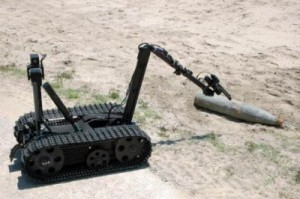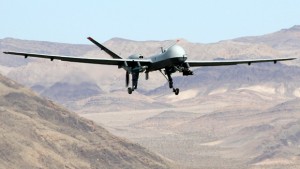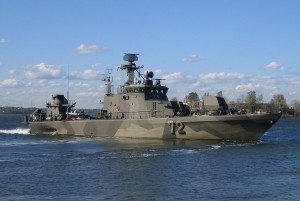By CDR Jeremy Thompson, USN
This concept proposal explores a technology solution to the problem of risk to first responders when identifying, neutralizing, and exploiting “surface-floating” maritime improvised explosive devices (SF/MIEDs).

When considering the proliferation of technology for use against land-based improvised explosive devices (IEDs), it may be puzzling to many observers why remote IED Defeat (IEDD) technologies, particularly robots, have yet to fully cross over into the maritime domain. Although some unmanned underwater vehicle programs designed for limpet mine-like object detection on ships are in development, much less attention has been given to countering SF/MIEDs. In general, the purpose of MIEDs is to destroy, incapacitate, harass, divert, or distract targets such as ships, maritime critical infrastructure and key resources (CI/KR), and personnel. MIEDs may also present obstacles (real or perceived) with the purpose of area denial or egress denial. As a subset of the MIED family, the “surface-floating” MIED operates on the water’s surface in environments such as harbors, the littorals, the riparian, and the open ocean. It may be either free floating or self-propelled, with remote control (manual or pre-programmed) or with no control (moves with the current). It is a tempting low-tech, low-cost option for an adversary.
Thankfully, SF/MIED incidents have been rare in recent times, the last significant use occurring during the Vietnam war. Nonetheless, a capability gap is highlighted by the challenge they represent—namely, that a human must unnecessarily expose themselves to the object. One material solution to a surface-floating IED may be to develop an IED Defeat Unmanned Surface Vessel (USV) around a design philosophy based on IEDD robots used in land warfare. Protection of high value units and critical infrastructure / key resources would be its primary missions along with counter-area denial. Its most likely operating environment would be CI/KR dense areas such as harbors and seaports as well as the riparian environment since rivers are constricted in the water space available to shipping to maneuver around SF/MIED threats. A key element of design philosophy in an IEDD USV would be to meet the expectations of the customer—the first responder. Military explosive ordnance disposal (EOD) units and civilian bomb squads are much more likely to accept a platform in which the console and all other human interface features are nearly identical in look, placement, feel, and responsiveness as the most popular robots they have been accustomed to operating such as the TALON robot by QinetiQ and Packbot by iRobot.
A functional hierarchy could be drawn around major tasks such as reacquisition of a suspected surface-floating IED, identify/classify, threat removal, neutralization, and recovery of the IED for exploitation. Modularized payload packages to execute these tasks may include a towing package, an attachments package (e.g. hooks, magnets), a neutralization tool package to include both precision and general disruption EOD tools, an explosives, chemical, and radiological detection package, and an electronic counter-measures package.
Numerous trade-offs between weight, power, stability, and the complexity of modular packages would need to be considered and tested, however, variants like a “high-low” combination of a complex and simple USV working together may minimize some of the trade-off risk. If an IEDD USV were to be developed key recommendations include:
- Official liaison between NAVSEA (US Naval Sea Systems Command) between PMS-406 (Unmanned Maritime Systems) and PMS-408 (EOD/CREW program) to ensure the transfer of USV expertise between PMS divisions.
- A DOTMLPF assessment to determine whether limpet mines or surface-floating IEDs are more likely and more dangerous to U.S. assets and personnel given the uncertainty of future naval operations.
- Including civilian bomb squads in the design and development process early to increase the potential for demand and cross-over with the law enforcement sector and therefore reduced long-term program costs.
Current UUV programs under development include the Hull UUV Localization System (HULS) and Hovering Autonomous Underwater Vehicle (HAUV).
This article was re-posted by permission from, and appeared in its original form at NavalDrones.com.



